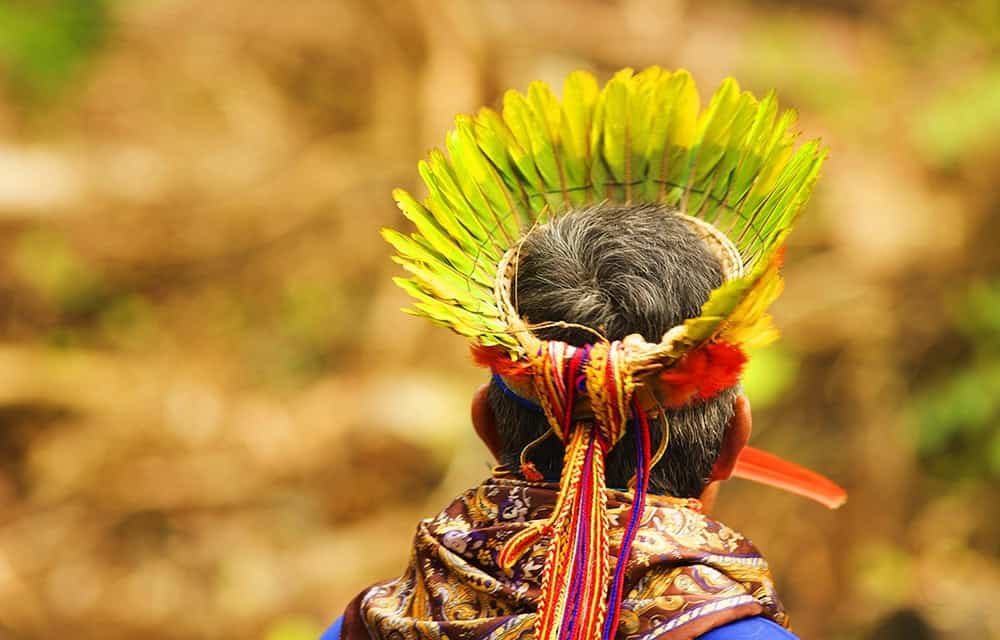Moving beyond a tokenistic participation of Indigenous Peoples in nature financing
An independent indigenous author
In recent years, Indigenous Peoples have become a ‘hot topic’ in the business, climate, and conservation communities. This has been the case, particularly after COP15 which ended with a landmark biodiversity agreement, the Kunming-Montreal Global Biodiversity Framework. The Framework has various targets, many of which relate to Indigenous Peoples. The various initiatives that increasingly mention Indigenous Peoples include but are not limited to disclosure standards, investor alliances, and proponents of biodiversity credit schemes.
Photo by Melibea
“Here in the Amazon, Indigenous Peoples are the last line of defense against the total destruction of the rainforest. Rather than receiving direct support, we now face a new wave of green colonialism that does nothing to challenge extractive agendas and undermines our rights.”
The imperative for including Indigenous Peoples in nature protection and restoration initiatives is simple. Indigenous Peoples protect a large share of the world’s remaining intact ecosystems, and the recognition of Indigenous Peoples’ rights over their territories have been shown to be crucial for biodiversity protection. Initiatives that seek to protect nature will simply not work well if they fail to ensure the participation of Indigenous Peoples, and respect for Indigenous Peoples’ rights.
But what is actually behind those various initiatives, and to what extent do they promote respect for Indigenous Peoples’ effective participation and protection of rights?
Some of these initiatives appear to have sought to promote Indigenous Peoples’ rights; for example, the investor initiative Nature Action 100+ asks companies to prioritize rights-based approaches developed in collaboration with Indigenous Peoples and local communities when they are affected.
However, other initiatives seem more concerned with pushing the financialization of nature onto Indigenous Peoples, while disregarding Indigenous Peoples’ rights, and thereby seriously undermining efforts to protect nature.
Standards for disclosure on nature
The perhaps most known initiative, the Taskforce for Nature-Related Financial Disclosures (TNFD) recommends companies to disclose their material risks, impacts, and dependencies on nature, as well as their human rights policies, engagement activities, and oversight by the board and management, with respect to Indigenous Peoples, and other stakeholders. They have also developed Guidance on engagement with Indigenous Peoples, Local Communities and affected stakeholders.
Indigenous organizations have been clear that effective disclosure requires “companies to publicly report on their value chains, including the exact name and location of their suppliers, and actual and potential impacts identified, in order to allow us to identify the actors violating our human rights including our right to a healthy environment, and give us the necessary tools needed to monitor companies’ value chains...” However, TNFD does not require companies to disclose their human rights or environmental impacts, nor to provide transparency of their value chains.
To answer whether the framework would be effective for uncovering environmental damage on Indigenous territories, one simply needs to ask:
What would self-disclosure look like for a company whose business model is reliant on displacing Indigenous Peoples from their territories and destroying their territories, either directly or through their value chains?
Most likely, the company would use their TNFD report to greenwash, by claiming that they “engaged” some group of Indigenous people, without providing the transparency required.
Nature-based solutions and biodiversity credits
The World Economic Forum’s report Embedding Indigenous Knowledge in the Conservation and Restoration of Landscapes was clear that actors engaged in nature-based solutions should “design and follow processes that will ensure all the individual and collective rights of Indigenous peoples are protected and respected, including as enshrined in the United Nations Declaration on the Rights of Indigenous Peoples (UNDRIP).” Unfortunately, this has not been the case for the majority of initiatives working on biodiversity credits.
A report by Pollination, for example, finds that “the majority of schemes do not establish comprehensive requirements for obtaining free, prior and informed consent (FPIC) and do not require co-ownership, partnership or benefit-sharing models with IPs and LCs.”
The Taskforce on Nature Markets issued a set of final recommendations, without references to the rights of Indigenous Peoples; rather, the report was only concerned with economic benefits for Indigenous Peoples being derived from nature markets. In other words, it seems as if the message is that Indigenous Peoples should be happy with their rights being violated as long as they are economically compensated.
Likewise, the International Advisory Panel on Biodiversity Credits, which was launched by France and the UK, seems more concerned with benefits for Indigenous Peoples rather than rights. Their report A Global Roadmap to Harness Biodiversity Credits for the Benefit of People and Planet for example, states that they will set up an advisory panel focused on five focal areas, none of which mentions Indigenous Peoples’ rights. Co-incidentally, both France and the United Kingdom have previously sought to impede the protection of Indigenous Peoples’ rights.
In the negotiation of the EU regulation on deforestation-free products, France sought to oppose the inclusion of Indigenous Peoples’ rights in the regulation.
Likewise, the United Kingdom has stated that “With the exception of the right of self-determination, we, therefore, do not accept the concept of collective human rights in international law,” despite the recognition of collective rights being crucial for Indigenous Peoples' physical and cultural survival as distinct people.
The rights of Indigenous Peoples
The rights of Indigenous Peoples are most clearly articulated through the UN Declaration on the Rights of Indigenous Peoples (UNDRIP). The Declaration “expresses and reflects legal commitments under the Charter of the United Nations, as well as treaties, judicial decisions, principles and customary international law.” As such, it is largely reflective of international human rights law; however, there is a tendency among some actors to claim that the Declaration simply represents non-binding statements. This is incorrect; several binding treaties and conventions, and in some cases, national regulation have been interpreted to guarantee many of the rights enshrined in the Declaration.
For example, the requirement to obtain free prior and informed consent of Indigenous Peoples, is required under the International Covenant on Civil and Political Rights, the American Convention on Human Rights, and the African Charter on Human and Peoples’ rights.
It should also be noted that Indigenous Peoples do not just enjoy human rights individually, but have rights as collective subjects of international law and not only as members of such communities or peoples. The refusal of both France and the United Kingdom to recognize and protect those collective rights seriously calls into question the good faith of their biodiversity credit initiatives.
Despite Indigenous Peoples’ rights being recognized and protected by various international instruments, as well as national constitutions and regulations, governments and private sector actors seem to frequently disregard or fail to respect those rights, ultimately creating unnecessary risks.
In Colombia for example, a judge suspended a carbon credit project that sold credits without the knowledge and consent of local Indigenous Peoples. Respecting Indigenous Peoples’ rights is not just a matter of compliance with international human rights law, but also critical for business viability.
Recognizing the contribution of indigenous peoples to protecting the planet
Across the world, there is a tendency of governments and businesses to seek to compensate Indigenous Peoples to stop cutting trees, e.g., through REDD+ programs. According to this logic, Indigenous Peoples should be compensated to stop destroying nature. However, this logic is incorrect.
Most of the destruction occurs outside of Indigenous territories, or by outsiders to Indigenous territories, or where Indigenous Peoples lack legal rights to their territories, or where Indigenous Peoples lack institutional, legal, technical, and financial capacity to protect their territories against external threats.
The international community should recognize the valuable contribution that Indigenous Peoples have already made to protect the planet and support their continued defense and protection of nature, not conditional on being able to claim offsets or credits, but rather because of the work Indigenous Peoples have undertaken and its inherent value for the whole planet, and for all the historical injustices done unto Indigenous Peoples, who will suffer the most burden from climate change and the ongoing destruction of nature.
Furthermore, the international community should recognize that threats to Indigenous Peoples exist in a social, economic, and political context that cannot be fully addressed with market-based solutions, but rather, seek to revert the very extractive and colonialist paradigms that drive the destruction of Indigenous territories. The first priority should be to stop, halt, nullify, and revert destructive activities on Indigenous territories that have been granted without our consent, and to enable Indigenous Peoples to reclaim or re-purchase traditional Indigenous lands that have been unlawfully or coercively taken or privatized.
In no instance should Indigenous territories be used for claiming ‘biodiversity offsets’ that serve to enable further environmental destruction elsewhere.
Moving beyond a tokenistic approach to Indigenous participation
It is time that Indigenous Peoples’ participation in such initiatives move beyond tokenistic approaches toward true and equitable participation. Simply having Indigenous participants in an advisory board without decision-making power, or consulting with Indigenous groups without incorporating their input does not on its own constitute effective participation. Such approaches work to legitimize the agendas of corporations and national governments that have historically caused and continue to cause, the destruction of nature while putting Indigenous Peoples at a disadvantage.
It is critical that Indigenous Peoples have an equal say regarding the development of those various initiatives from the conceptualization stage, and have access to sufficient resources, capacity-building, and independent expert and legal advice to develop our own mechanisms, assessments, studies, and standards for protecting the planet.
Effective participation of Indigenous Peoples also requires an understanding of the situation of Indigenous Peoples across the world. Not only are we consistently discriminated against and excluded from participating in decisions affecting us, but we also face many barriers to participating, and face severe risks when defending our rights, including violence and criminalization.
For example, in October, an Indigenous leader from Brazil was killed after denouncing the invasion of their territories by businessmen at the United Nations. This is not an isolated case; over 60% of Indigenous territories worldwide are currently threatened by industrial activities, and although Indigenous Peoples comprise just 6% of the world’s population, we comprise over a third of assassinated environmental defenders in the last decade.
As such, simply seeking to include Indigenous people in a system that already works against us and harms the planet can never be just and equitable. It will also not be effective in protecting and restoring nature, nor for reverting the irreversible tipping points that are closer day by day.
Instead, the international community should first seek to learn from, understand and fit into Indigenous Peoples’ worldviews and priorities. Failure to ensure the effective participation of Indigenous Peoples and failure to ensure respect for our rights means that any attempt to protect and restore nature will be in vain.
The author of this article, who is a member of an Amazonian Indigenous people, has chosen to remain anonymous.

